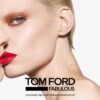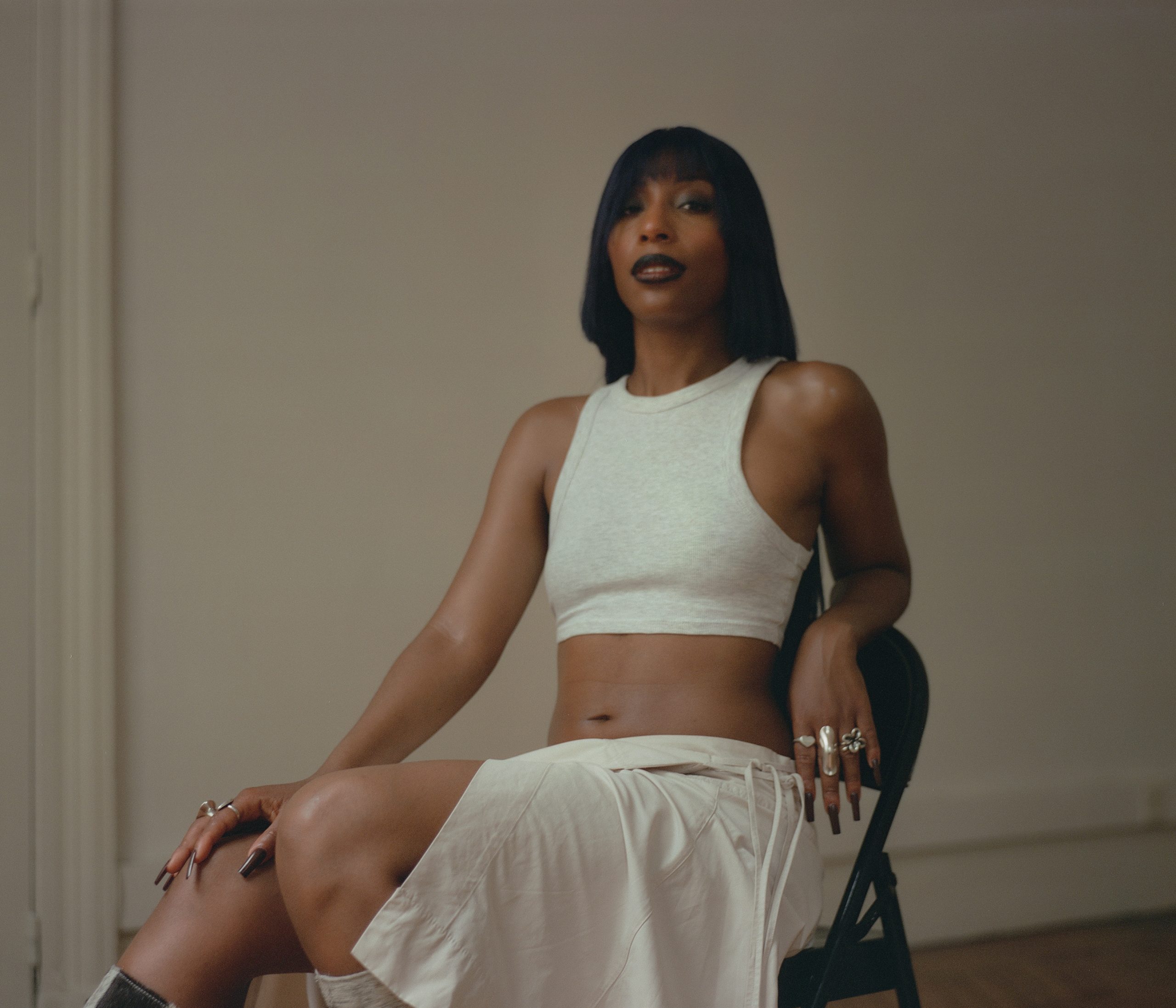
Rewrite
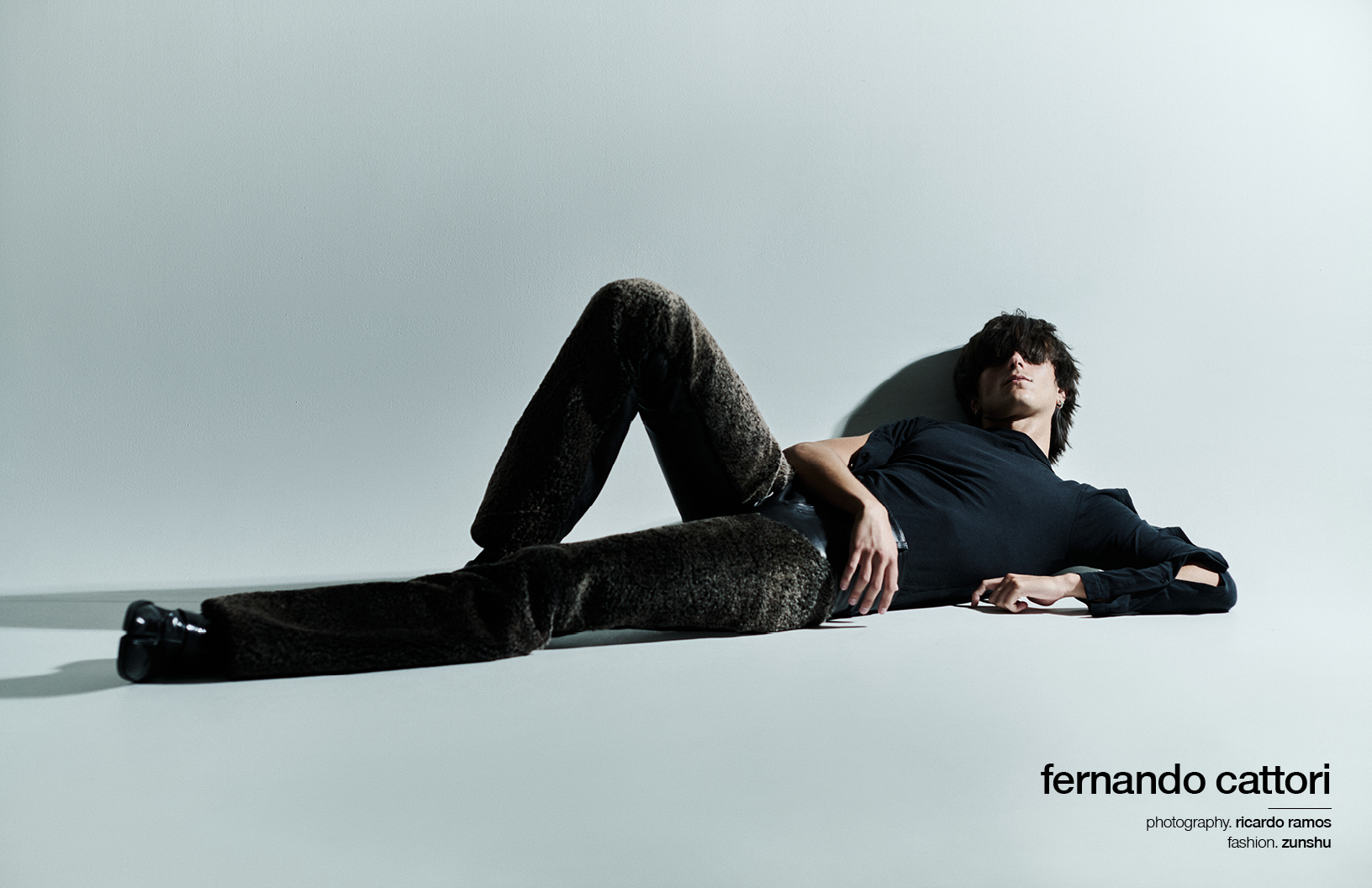
shirt. ELBORDE
trousers. Campillo
shoes. Maison Margiela
It’s difficult for anyone to be the new kid, but Fernando Cattori embraces newness with ease. The Mexican actor first fell in love with acting when he picked up his first camcorder at the age of seven, falling in love with the making of film before he even really knew it was. Now, after being nominated for a Latin Grammy for ‘Nacimos Llorando’ and a career so far that spans directing, acting, and photography, it’s clear he’s crafting a filmography that is defined by curiosity and versatility. His next role has him stepping into new, uncharted territory — joining the cast in the final season of this summer’s most talked about show, ‘The Summer I Turned Pretty‘, in the role of Benito which serves as his first English-speaking role.
Sitting down with Schön!, Cattori reflects on the challenges of moving between directing and performing, the surreal experience of joining a global hit series, and the stories that continue to inspire his path forward.
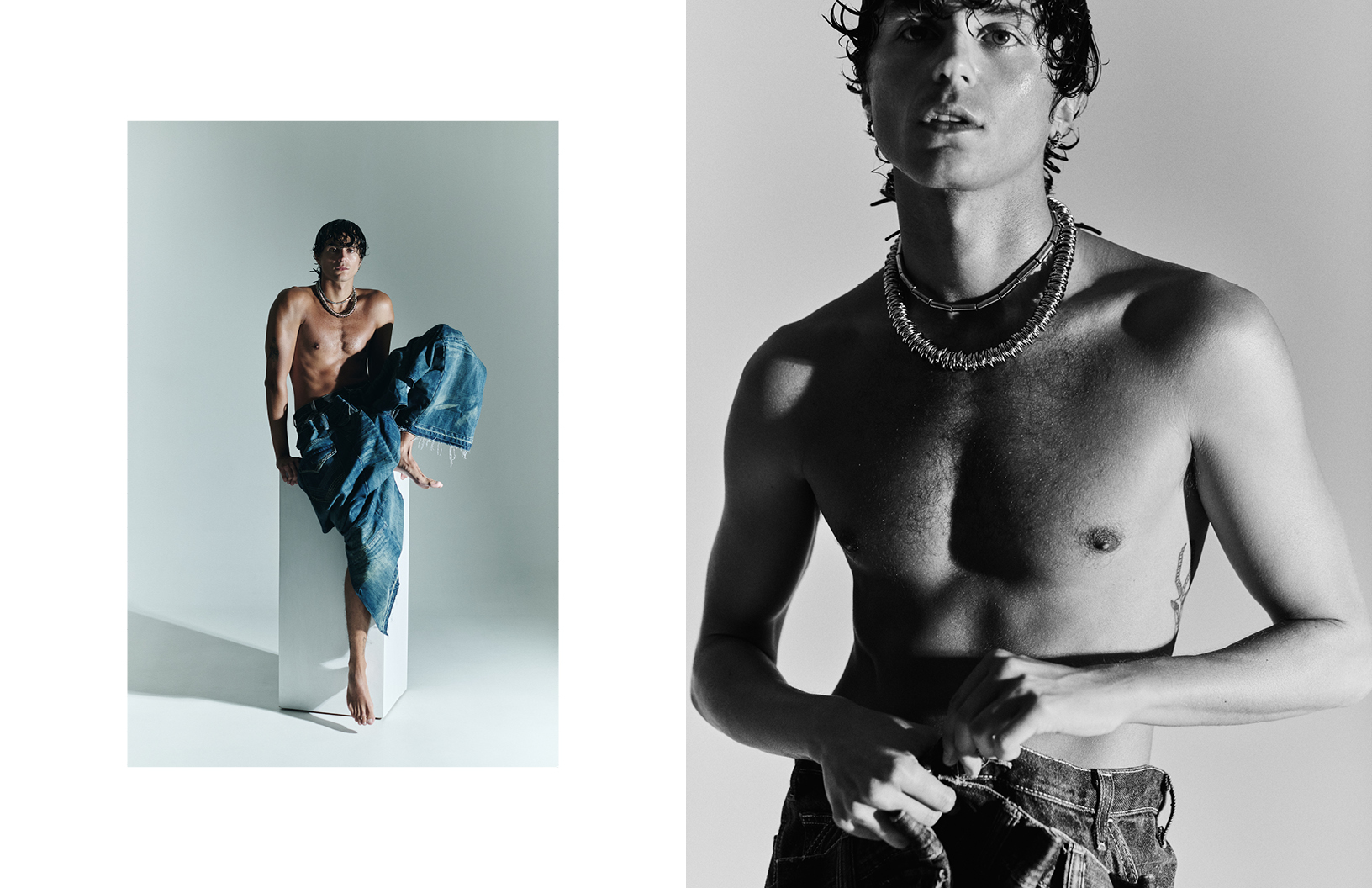
jeans. SENTIMIENTO
necklaces. ELBORDE
opposite
jeans. SENTIMIENTO
necklaces. ELBORDE
Do you remember the first time you held a camera in your hands? What did that moment awaken in you?
The first time I held a camera, I was about seven. My dad had just upgraded his VCR camcorder and casually handed me the old one. It used cassette tapes, so I kept recording and rerecording over the same one. Most of my “masterpieces” with siblings and neighbours vanished almost instantly, swallowed up by the next experiment. But in a way, that ephemeral aspect still feels like the purest form of art.
Your education and experiences span different countries and disciplines. How did being exposed to such multicultural and multidisciplinary environments shape the way you create today?
My parents wanted me to know my own country first; it was a non-negotiable, so I didn’t travel abroad much as a kid. Instead, I plunged into Mexican culture hard. With two siblings who were professional tennis players, most of my early “travels” were just me being dragged along on road trips to small towns and big cities for tournaments. Later on, I began visiting Europe and the U.S. for work and leisure, and those trips only sharpened my sense of Mexico. Travel has a way of putting home into perspective — its beauty, its contradictions, its ubiquity and its uniqueness. And I think every Mexican artist would agree: we always carry the country with us.
Coming from advertising, what tools or perspectives from directing commercials still live in your creative process — and how do they continue to challenge or inspire you?
Advertising is complicated. That’s just the hard truth. It pays well, and I’d say you can find the most creative people in the film industry in it. But there’s a lot I don’t admire — the harsh hierarchies, the hostilities, the way people can be treated, the constant pressure from the client–agency–production triangle. There’s a lot of money being put into it, so everyone is aware of making it and not breaking it. But we should all chill a bit.
On a brighter note, it also taught me resilience. It forced me to be fast with solutions, bold with ideas, and methodical about finishing what I start. With a sane distance to it. From research and writing, to pitching and winning, to shooting, editing (I’m a bit of an editing freak), and finally delivering something that makes the brand happy, it gave me discipline. More than anything, it taught me grit and patience, which I carry into every project. And I’ve met some great friends along the way! Plus, I get to give jobs to my people!
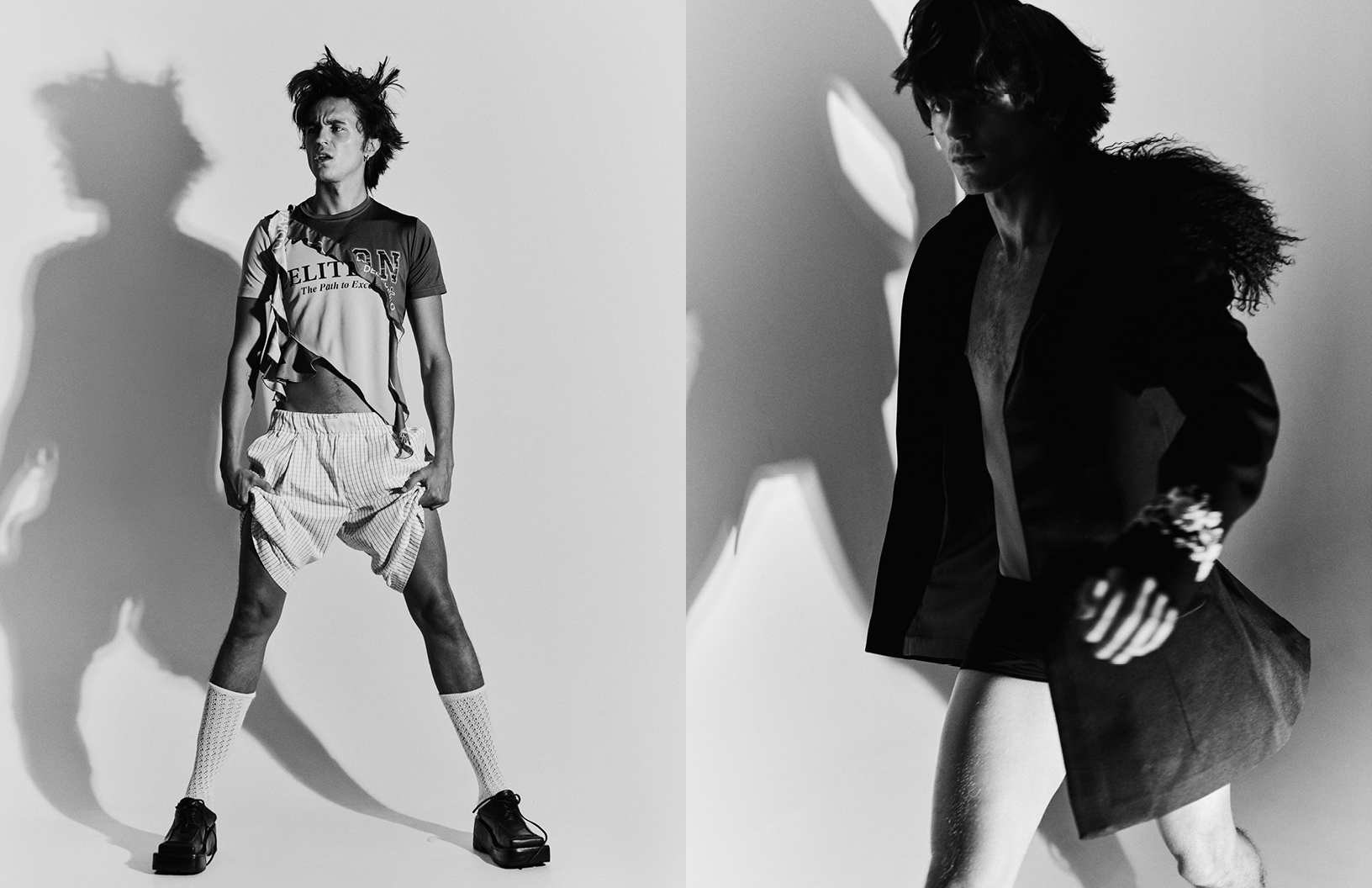
shirt. SENTIMIENTO
shorts. Public Display of Affection
shoes. CRUDA
opposite
jacket. Campillo
You’ve built a career both in front of and behind the camera. How do those dual perspectives complement or clash with each other, and how has that tension influenced your work?
This is probably the question I get asked the most. And there’s no final answer, ok? But… Acting has taught me to believe and to listen. Directing has taught me to speak with confidence and be decisive with my words. One feels more cerebral, the other more emotional, though they’re always brushing up against each other. As an actor, the task is to observe your partner, to really listen, and to live inside the fiction and the friction. As a director, the observation is different — you step outside the fiction and pay meticulous attention to every detail of the situation. They may feel like opposite endeavours, but in that opposition, they complement each other: one teaches me patience, the other perspective, and together they sharpen the way I observe the world — how I take in inspiration.
As a director, you’ve taken on diverse projects that have led to opportunities like being nominated for a Latin Grammy for ‘Nacimos Llorando’. How did that experience open new doors for you?
‘Nacimos Llorando’ was born partly out of my own anxieties and partly out of a desire to experiment with friends — to write something, work with actors, and watch words come alive. Inspired by my friend Fran Straube’s musical project: Rubio. It became the biggest investment I’ve made as a director, not just financially but mentally and wholeheartedly. Creating something so personal is incredibly vulnerable, but it always pays off.
For me, the best part of making art is starting something, finishing it, and then sharing it with the world — because that’s the only way you really see your own deficiencies tete-a-tete and get clarity on where you want to take your work and your voice. Of course, the film has its strengths and its flaws, but I learned a lot, and I’m just grateful I did it. The Grammy nomination felt less like a surprise and more like a confirmation, and it’s opened doors to commercial projects where I can bring that same narrative curiosity into play. I’m still figuring out my voice and my style, and this film was just a photograph of that journey.
Transitioning from directing to acting brings out different kinds of sensitivities. How has navigating between these crafts changed the way you see storytelling and yourself?
I’ve come to realize that performance has its own kind of epicness — not in scale or infrastructure, but in intimacy. Lately, I’ve been more drawn to small, almost diminutive stories because every person is a character and every character has something to tell. Acting has taught me to value what an actor brings to a story: their humanity. I believe humanity should always be at the center of any creative work.
Now I find myself more interested in writing five characters in a small room and simply watching what unfolds. Directing still excites me, but it often makes me think in images, while acting has shifted my focus toward emotions and moments that linger in the brain — or in the heart. But I’m constantly watching people and making up films in my head. I really need to start journaling and make those stories into films!
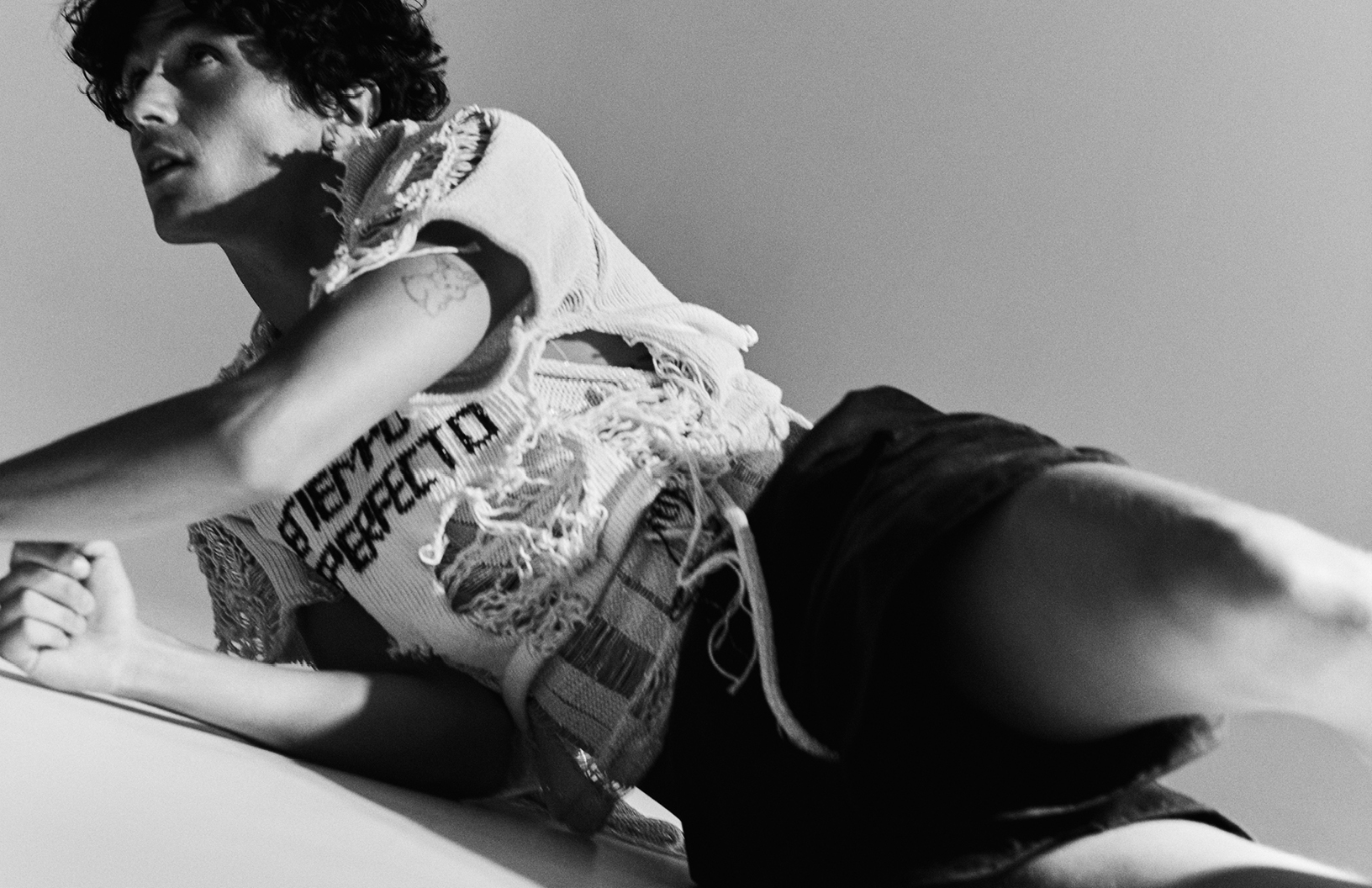
shirts (layered). CANNEO
shorts. Public Display of Affection
What has been the role that challenged you the most — not just technically, but in terms of what it taught you and how it transformed your path afterward?
It still feels relatively new to fully believe that I am a performer. I get imposter syndrome daily. Every job has been challenging in its own way — I’m constantly asking fellow actors for tips, in awe of their discipline, finesse, or attention to detail. But if I had to name one, I’d say Benito was the most challenging role so far. It was my first time acting in English, and while I speak it fluently, my brain still defaults to Spanish. Playing a character who thought and felt in another language was a huge shift.
On top of that, I knew the show was big, and I definitely put extra pressure on myself. Then there was the pace — I had only done films before, where the scale is smaller and you have space to experiment and be more fluid or improvise more. I love improv, but… Television moves fast. You have to hit the spot, make decisions quickly, and trust them. That experience taught me precision and confidence — to stop overthinking and simply commit. Lola, for instance, is a brutal powerhouse of a performer; she’s just on point and never misses anything. She’s a lovely human being as well — love Lola.
In the final season of ‘The Summer I Turned Pretty’, you bring Benito to life — a character who was barely mentioned in the books but becomes central in the series. What was it like stepping into the cast at such a crucial moment in the story?
Honestly, I had no idea what I was getting into until I stepped onto that massive set in Paris. I remember thinking, “What is happening to my life? How did I end up here?” Even now, I don’t think I’ll fully grasp the experience until the season is out, people respond to it, and maybe even a couple of years have passed. What I do know is that it was magical, completely unprecedented in my life — and, I’d say, in the life of almost any actor in Mexico. It feels like a once-in-a-lifetime experience… That maybe, if I’m lucky, might happen again.
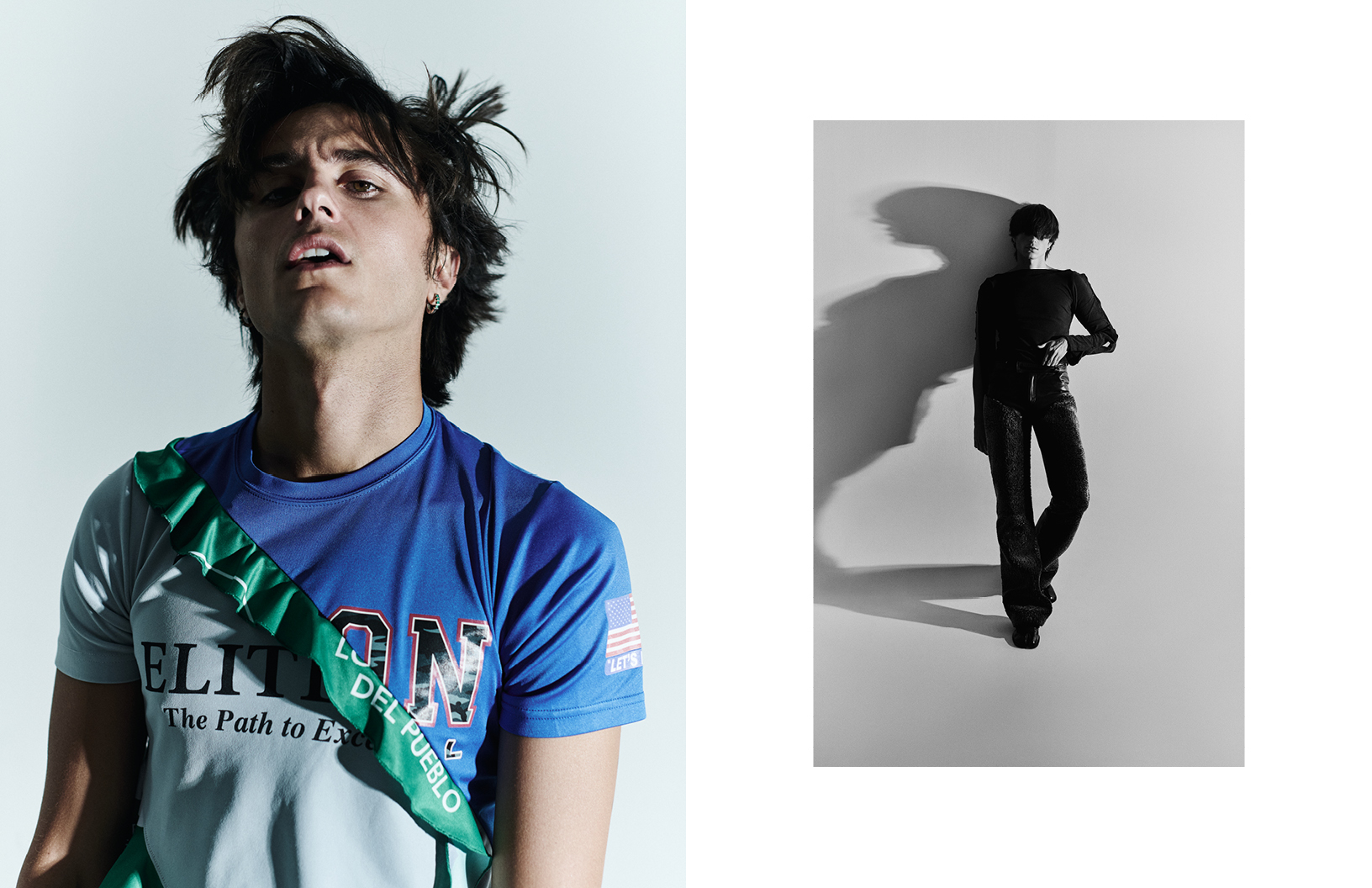
shirt. SENTIMIENTO
opposite
shirt. ELBORDE
trousers. Campillo
shoes. Maison Margiela
Your arrival sparked a lot of conversation online, with fans speculating about Benito’s place in the story. How has it felt to enter that enormous dialogue and witness the reactions firsthand?
Again, it just feels surreal. I try to have a healthy distance from expectations, so I try to avoid diving into that conversation.
How was it working alongside Lola Tung? What was the connection like between you and her while shaping Benito’s relationship on screen?
When we first met during the callback on Zoom, Lola was immediately the kindest presence. I had just woken up, taken a shower, and logged on half-asleep, but she made me feel completely comfortable. When I got to Paris, we bonded almost instantly over music — I’m obsessed with indie female singer-songwriters and she is as well. We even bonded over Addison Rae – and were constantly doing the Diet Pepsi TikTok dance by this guy. From then on, we were basically singing and dancing whenever we had the chance. I’m sure it was a little annoying for the rest of the cast and crew, but it was so much fun… she really brought out the repressed musical-theatre kid in me.
She’s also incredibly generous. Whenever I messed up a line or felt unsure about my performance, she’d reassure me and make me relax. That kind of lightness is rare, and it made working together feel effortless. We still stay in touch, mostly with really crappy selfies of us making weird faces, or new music from cool artists. I saw her a couple of months ago in New York for dinner and martinis! She’s a truly amazing human being, and she’s going to be huge, not just because of her talent but because of who she is.
Having directed and acted in Mexican projects, what differences did you notice when stepping into a large-scale international production like this one, especially as an actor this time?
The short answer would be money and infrastructure. Whether we like it or not, the U.S. really is the mecca of media, so stepping into it felt like entering the big leagues. What I loved is that I was almost unaware of how big it actually was, and I hope to keep that mindset for the rest of my career. Staying a little unaware keeps me grounded in the process and stops me from ever thinking I’ve “made it.”
Mexico, of course, has its own virtues. Making films there is hard, but that’s what makes the people who do it so passionate. Crews in Mexico are deeply in love with cinema, and you feel that devotion in every frame.
When preparing for a new character, how do you draw from your intuition and personal experiences to make them feel real?
I usually start by drawing from people I know: friends, colleagues, even acquaintances or past relations and using them to build the exoskeleton of a character. I also look to other performances, especially in film. I’m a huge film buff, so I naturally connect my characters to ones I’ve seen on screen, finding echoes or contrasts. And finally, music is essential. I make playlists for each character, which helps me focus and slip into their world. That mix of observation, memory, and intuition is what makes them feel real to me.
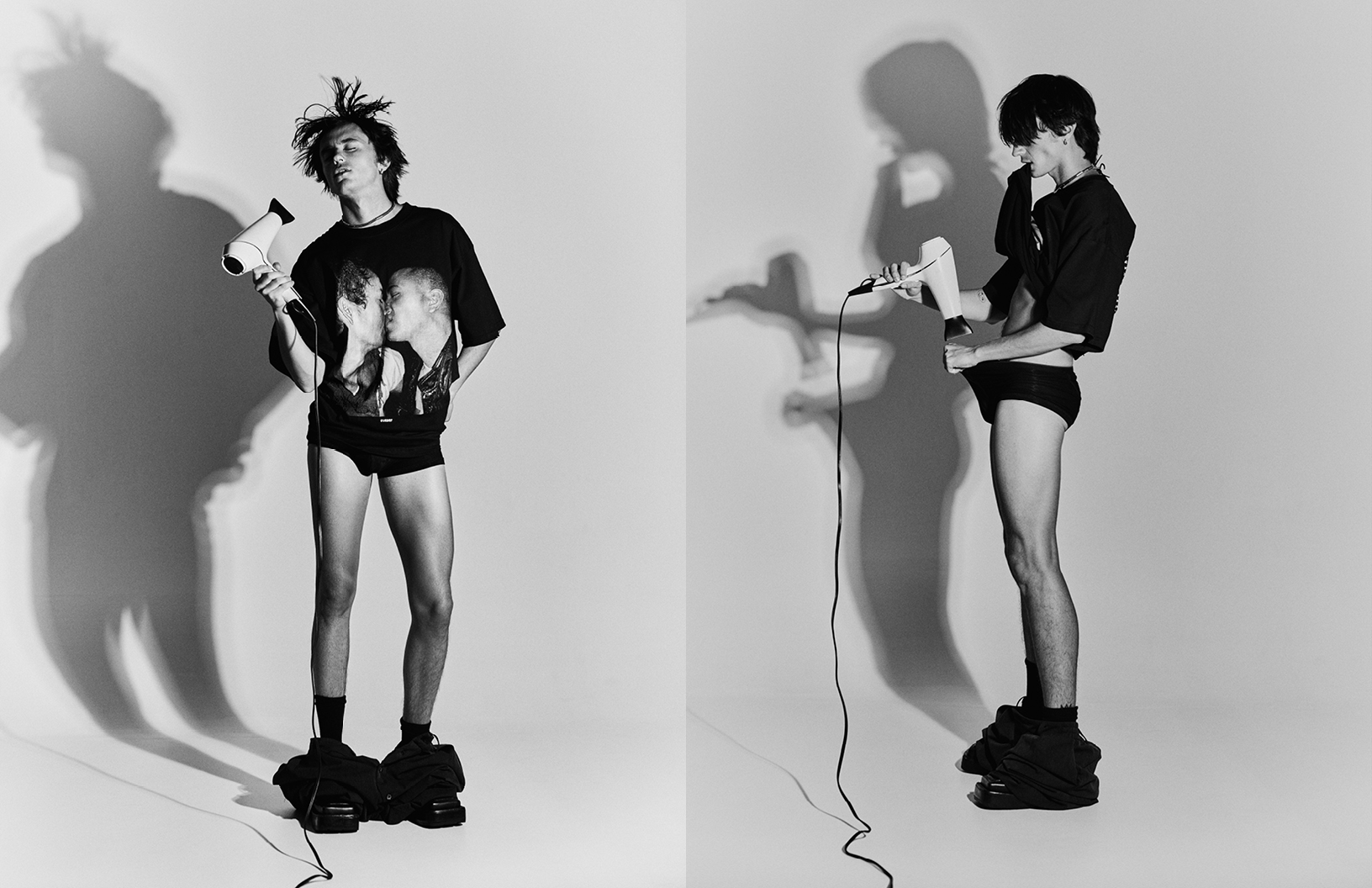
shirt. ESE CHICO
opposite
shirt. ESE CHICO
As Mexican talent continues to gain international recognition, how do you feel about being part of that wave and representing this growth on a global stage?
Honestly, even this idea makes me feel like an imposter, but I love it. Mexican talent has long been on the global stage. We have incredible actresses and actors, writers, and directors whose work I truly admire, and I don’t put myself in their league. Lately, great female-led stories have reached pinnacles across the world. If I get to be included in that wave, I’ll embrace it with all my heart. What excites me most is seeing Latin America finally getting the spotlight it deserves. It’s such a rich, ever-changing territory, because of its ups and downs and nuances that everything that comes out of it feels fresh and urgent, and I’m proud to be even a small part of that.
Looking ahead, do you see yourself directing again soon, or is acting the focus for now? What advice would you share with young creatives who want to explore multiple artistic disciplines without feeling they have to choose just one?
I’m constantly pivoting between directing and acting — and I pray to God that’ll always be my personal zeitgeist. I’m slowly building the confidence to believe I can take on fully narrative work. Right now, I’m writing my first feature film, inspired by my childhood in Cancún, a resort town with its own peculiar rhythm. I value every hour spent on set, whether acting or directing, because being there, with a crew and a cast, telling a story, is the ultimate goal. It doesn’t matter if it’s a 30-second spot or a two-hour film; that’s the space I always want to inhabit. Honestly, it’s what I think about all the time, almost pathologically.
As for advice: don’t be afraid to explore more than one discipline. Each practice feeds the other, and you don’t have to choose just one voice. Let them overlap, let them collide: the friction is often where the best work lives. Error is key. What happens suits. Just try stuff and show it to your friends.
And finally, what kinds of stories or roles excite you most right now, the ones you’re eager to bring to life in the near future?
Right now, I’m drawn to indie films, almost mumblecore in spirit, where the story and characters are built collectively with the cast, director, and producers. The world feels so frenetic at the moment that I find myself wanting to turn the lens toward smaller spaces — a family, a road trip, a grieving process. Those quieter stories really interest me. At the same time, I’d love to push myself into farcical comedy, precisely because it terrifies me. And if something scares you, that’s probably exactly where you should go.
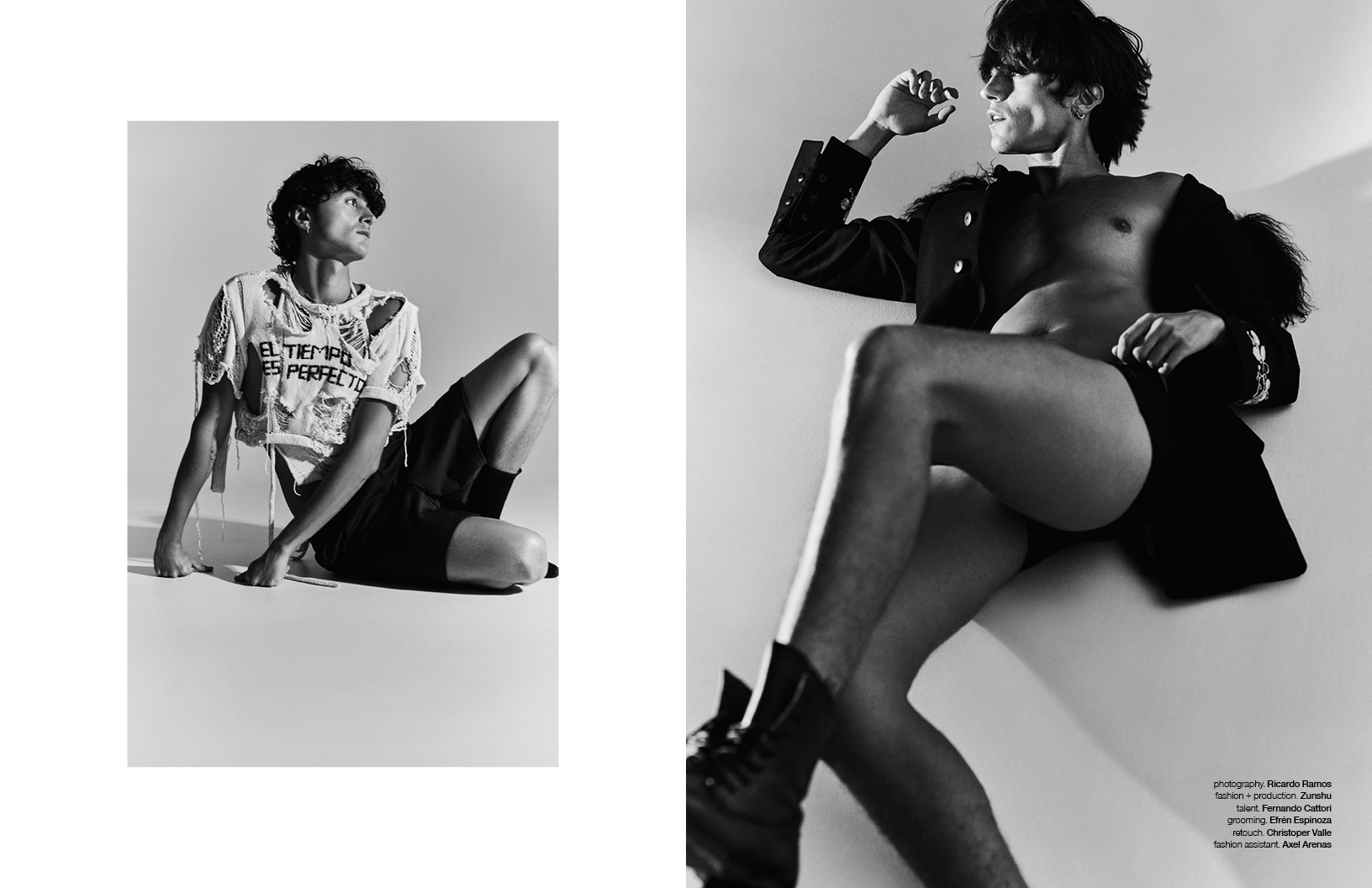
shirts (layered). CANNEO
shorts. Public Display of Affection
opposite
jacket. Campillo
shoes. CRUDA
‘The Summer I Turned Pretty’ is streaming now on Amazon Prime.
photography. Ricardo Ramos
fashion + production. Zunshu
talent. Fernando Cattori
grooming. Efrén Espinoza
retouch. Christoper Valle
pr. Belong Media
fashion assistant. Axel Arenas
interview. Kelsey Barnes
in HTML format, including tags, to make it appealing and easy to read for Japanese-speaking readers aged 20 to 40 interested in fashion. Organize the content with appropriate headings and subheadings (h1, h2, h3, h4, h5, h6), translating all text, including headings, into Japanese. Retain any existing
tags from

shirt. ELBORDE
trousers. Campillo
shoes. Maison Margiela
It’s difficult for anyone to be the new kid, but Fernando Cattori embraces newness with ease. The Mexican actor first fell in love with acting when he picked up his first camcorder at the age of seven, falling in love with the making of film before he even really knew it was. Now, after being nominated for a Latin Grammy for ‘Nacimos Llorando’ and a career so far that spans directing, acting, and photography, it’s clear he’s crafting a filmography that is defined by curiosity and versatility. His next role has him stepping into new, uncharted territory — joining the cast in the final season of this summer’s most talked about show, ‘The Summer I Turned Pretty‘, in the role of Benito which serves as his first English-speaking role.
Sitting down with Schön!, Cattori reflects on the challenges of moving between directing and performing, the surreal experience of joining a global hit series, and the stories that continue to inspire his path forward.

jeans. SENTIMIENTO
necklaces. ELBORDE
opposite
jeans. SENTIMIENTO
necklaces. ELBORDE
Do you remember the first time you held a camera in your hands? What did that moment awaken in you?
The first time I held a camera, I was about seven. My dad had just upgraded his VCR camcorder and casually handed me the old one. It used cassette tapes, so I kept recording and rerecording over the same one. Most of my “masterpieces” with siblings and neighbours vanished almost instantly, swallowed up by the next experiment. But in a way, that ephemeral aspect still feels like the purest form of art.
Your education and experiences span different countries and disciplines. How did being exposed to such multicultural and multidisciplinary environments shape the way you create today?
My parents wanted me to know my own country first; it was a non-negotiable, so I didn’t travel abroad much as a kid. Instead, I plunged into Mexican culture hard. With two siblings who were professional tennis players, most of my early “travels” were just me being dragged along on road trips to small towns and big cities for tournaments. Later on, I began visiting Europe and the U.S. for work and leisure, and those trips only sharpened my sense of Mexico. Travel has a way of putting home into perspective — its beauty, its contradictions, its ubiquity and its uniqueness. And I think every Mexican artist would agree: we always carry the country with us.
Coming from advertising, what tools or perspectives from directing commercials still live in your creative process — and how do they continue to challenge or inspire you?
Advertising is complicated. That’s just the hard truth. It pays well, and I’d say you can find the most creative people in the film industry in it. But there’s a lot I don’t admire — the harsh hierarchies, the hostilities, the way people can be treated, the constant pressure from the client–agency–production triangle. There’s a lot of money being put into it, so everyone is aware of making it and not breaking it. But we should all chill a bit.
On a brighter note, it also taught me resilience. It forced me to be fast with solutions, bold with ideas, and methodical about finishing what I start. With a sane distance to it. From research and writing, to pitching and winning, to shooting, editing (I’m a bit of an editing freak), and finally delivering something that makes the brand happy, it gave me discipline. More than anything, it taught me grit and patience, which I carry into every project. And I’ve met some great friends along the way! Plus, I get to give jobs to my people!

shirt. SENTIMIENTO
shorts. Public Display of Affection
shoes. CRUDA
opposite
jacket. Campillo
You’ve built a career both in front of and behind the camera. How do those dual perspectives complement or clash with each other, and how has that tension influenced your work?
This is probably the question I get asked the most. And there’s no final answer, ok? But… Acting has taught me to believe and to listen. Directing has taught me to speak with confidence and be decisive with my words. One feels more cerebral, the other more emotional, though they’re always brushing up against each other. As an actor, the task is to observe your partner, to really listen, and to live inside the fiction and the friction. As a director, the observation is different — you step outside the fiction and pay meticulous attention to every detail of the situation. They may feel like opposite endeavours, but in that opposition, they complement each other: one teaches me patience, the other perspective, and together they sharpen the way I observe the world — how I take in inspiration.
As a director, you’ve taken on diverse projects that have led to opportunities like being nominated for a Latin Grammy for ‘Nacimos Llorando’. How did that experience open new doors for you?
‘Nacimos Llorando’ was born partly out of my own anxieties and partly out of a desire to experiment with friends — to write something, work with actors, and watch words come alive. Inspired by my friend Fran Straube’s musical project: Rubio. It became the biggest investment I’ve made as a director, not just financially but mentally and wholeheartedly. Creating something so personal is incredibly vulnerable, but it always pays off.
For me, the best part of making art is starting something, finishing it, and then sharing it with the world — because that’s the only way you really see your own deficiencies tete-a-tete and get clarity on where you want to take your work and your voice. Of course, the film has its strengths and its flaws, but I learned a lot, and I’m just grateful I did it. The Grammy nomination felt less like a surprise and more like a confirmation, and it’s opened doors to commercial projects where I can bring that same narrative curiosity into play. I’m still figuring out my voice and my style, and this film was just a photograph of that journey.
Transitioning from directing to acting brings out different kinds of sensitivities. How has navigating between these crafts changed the way you see storytelling and yourself?
I’ve come to realize that performance has its own kind of epicness — not in scale or infrastructure, but in intimacy. Lately, I’ve been more drawn to small, almost diminutive stories because every person is a character and every character has something to tell. Acting has taught me to value what an actor brings to a story: their humanity. I believe humanity should always be at the center of any creative work.
Now I find myself more interested in writing five characters in a small room and simply watching what unfolds. Directing still excites me, but it often makes me think in images, while acting has shifted my focus toward emotions and moments that linger in the brain — or in the heart. But I’m constantly watching people and making up films in my head. I really need to start journaling and make those stories into films!

shirts (layered). CANNEO
shorts. Public Display of Affection
What has been the role that challenged you the most — not just technically, but in terms of what it taught you and how it transformed your path afterward?
It still feels relatively new to fully believe that I am a performer. I get imposter syndrome daily. Every job has been challenging in its own way — I’m constantly asking fellow actors for tips, in awe of their discipline, finesse, or attention to detail. But if I had to name one, I’d say Benito was the most challenging role so far. It was my first time acting in English, and while I speak it fluently, my brain still defaults to Spanish. Playing a character who thought and felt in another language was a huge shift.
On top of that, I knew the show was big, and I definitely put extra pressure on myself. Then there was the pace — I had only done films before, where the scale is smaller and you have space to experiment and be more fluid or improvise more. I love improv, but… Television moves fast. You have to hit the spot, make decisions quickly, and trust them. That experience taught me precision and confidence — to stop overthinking and simply commit. Lola, for instance, is a brutal powerhouse of a performer; she’s just on point and never misses anything. She’s a lovely human being as well — love Lola.
In the final season of ‘The Summer I Turned Pretty’, you bring Benito to life — a character who was barely mentioned in the books but becomes central in the series. What was it like stepping into the cast at such a crucial moment in the story?
Honestly, I had no idea what I was getting into until I stepped onto that massive set in Paris. I remember thinking, “What is happening to my life? How did I end up here?” Even now, I don’t think I’ll fully grasp the experience until the season is out, people respond to it, and maybe even a couple of years have passed. What I do know is that it was magical, completely unprecedented in my life — and, I’d say, in the life of almost any actor in Mexico. It feels like a once-in-a-lifetime experience… That maybe, if I’m lucky, might happen again.

shirt. SENTIMIENTO
opposite
shirt. ELBORDE
trousers. Campillo
shoes. Maison Margiela
Your arrival sparked a lot of conversation online, with fans speculating about Benito’s place in the story. How has it felt to enter that enormous dialogue and witness the reactions firsthand?
Again, it just feels surreal. I try to have a healthy distance from expectations, so I try to avoid diving into that conversation.
How was it working alongside Lola Tung? What was the connection like between you and her while shaping Benito’s relationship on screen?
When we first met during the callback on Zoom, Lola was immediately the kindest presence. I had just woken up, taken a shower, and logged on half-asleep, but she made me feel completely comfortable. When I got to Paris, we bonded almost instantly over music — I’m obsessed with indie female singer-songwriters and she is as well. We even bonded over Addison Rae – and were constantly doing the Diet Pepsi TikTok dance by this guy. From then on, we were basically singing and dancing whenever we had the chance. I’m sure it was a little annoying for the rest of the cast and crew, but it was so much fun… she really brought out the repressed musical-theatre kid in me.
She’s also incredibly generous. Whenever I messed up a line or felt unsure about my performance, she’d reassure me and make me relax. That kind of lightness is rare, and it made working together feel effortless. We still stay in touch, mostly with really crappy selfies of us making weird faces, or new music from cool artists. I saw her a couple of months ago in New York for dinner and martinis! She’s a truly amazing human being, and she’s going to be huge, not just because of her talent but because of who she is.
Having directed and acted in Mexican projects, what differences did you notice when stepping into a large-scale international production like this one, especially as an actor this time?
The short answer would be money and infrastructure. Whether we like it or not, the U.S. really is the mecca of media, so stepping into it felt like entering the big leagues. What I loved is that I was almost unaware of how big it actually was, and I hope to keep that mindset for the rest of my career. Staying a little unaware keeps me grounded in the process and stops me from ever thinking I’ve “made it.”
Mexico, of course, has its own virtues. Making films there is hard, but that’s what makes the people who do it so passionate. Crews in Mexico are deeply in love with cinema, and you feel that devotion in every frame.
When preparing for a new character, how do you draw from your intuition and personal experiences to make them feel real?
I usually start by drawing from people I know: friends, colleagues, even acquaintances or past relations and using them to build the exoskeleton of a character. I also look to other performances, especially in film. I’m a huge film buff, so I naturally connect my characters to ones I’ve seen on screen, finding echoes or contrasts. And finally, music is essential. I make playlists for each character, which helps me focus and slip into their world. That mix of observation, memory, and intuition is what makes them feel real to me.

shirt. ESE CHICO
opposite
shirt. ESE CHICO
As Mexican talent continues to gain international recognition, how do you feel about being part of that wave and representing this growth on a global stage?
Honestly, even this idea makes me feel like an imposter, but I love it. Mexican talent has long been on the global stage. We have incredible actresses and actors, writers, and directors whose work I truly admire, and I don’t put myself in their league. Lately, great female-led stories have reached pinnacles across the world. If I get to be included in that wave, I’ll embrace it with all my heart. What excites me most is seeing Latin America finally getting the spotlight it deserves. It’s such a rich, ever-changing territory, because of its ups and downs and nuances that everything that comes out of it feels fresh and urgent, and I’m proud to be even a small part of that.
Looking ahead, do you see yourself directing again soon, or is acting the focus for now? What advice would you share with young creatives who want to explore multiple artistic disciplines without feeling they have to choose just one?
I’m constantly pivoting between directing and acting — and I pray to God that’ll always be my personal zeitgeist. I’m slowly building the confidence to believe I can take on fully narrative work. Right now, I’m writing my first feature film, inspired by my childhood in Cancún, a resort town with its own peculiar rhythm. I value every hour spent on set, whether acting or directing, because being there, with a crew and a cast, telling a story, is the ultimate goal. It doesn’t matter if it’s a 30-second spot or a two-hour film; that’s the space I always want to inhabit. Honestly, it’s what I think about all the time, almost pathologically.
As for advice: don’t be afraid to explore more than one discipline. Each practice feeds the other, and you don’t have to choose just one voice. Let them overlap, let them collide: the friction is often where the best work lives. Error is key. What happens suits. Just try stuff and show it to your friends.
And finally, what kinds of stories or roles excite you most right now, the ones you’re eager to bring to life in the near future?
Right now, I’m drawn to indie films, almost mumblecore in spirit, where the story and characters are built collectively with the cast, director, and producers. The world feels so frenetic at the moment that I find myself wanting to turn the lens toward smaller spaces — a family, a road trip, a grieving process. Those quieter stories really interest me. At the same time, I’d love to push myself into farcical comedy, precisely because it terrifies me. And if something scares you, that’s probably exactly where you should go.

shirts (layered). CANNEO
shorts. Public Display of Affection
opposite
jacket. Campillo
shoes. CRUDA
‘The Summer I Turned Pretty’ is streaming now on Amazon Prime.
photography. Ricardo Ramos
fashion + production. Zunshu
talent. Fernando Cattori
grooming. Efrén Espinoza
retouch. Christoper Valle
pr. Belong Media
fashion assistant. Axel Arenas
interview. Kelsey Barnes
and integrate them seamlessly into the new content without adding new tags. Ensure the new content is fashion-related, written entirely in Japanese, and approximately 1500 words. Conclude with a “結論” section and a well-formatted “よくある質問” section. Avoid including an introduction or a note explaining the process.
